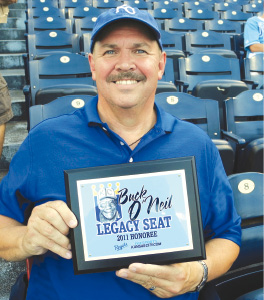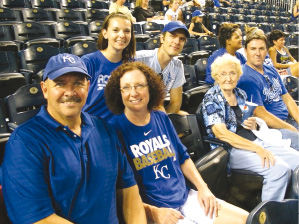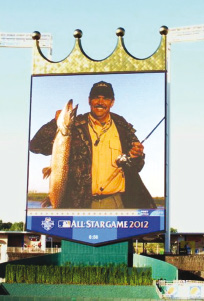
By Leslie Collins
Northeast News
September 14, 2011
When Kenneth Kieser went to a Kansas City Royals game earlier in August, he wasn’t there only for baseball. He was there as a Buck O’Neil Legacy Seat 2011 Honoree.
“I’m honored beyond belief,” Kieser said of his award. “Buck O’Neil is one of the people who have done a lot for baseball, which is the game I love, and done a tremendous amount for this town. He was one impressive man.”
Kieser, outdoors columnist for Northeast News, was chosen among 13,000 nominations to receive the Buck O’Neil honor.
For every home game, Royals officials select a new local honoree who embodies Buck’s spirit.
Kieser was selected for his dedication to teaching mentally and physically challenged youth how to fish and for his induction into the National Fresh Water Fishing Hall of Fame in Hayward, Wis.
Growing up, Kieser learned the art of fishing from his grandparents, who would pick him up in their Model A to go fishing at a nearby pond.
Since the age of eight, Kieser has written about the outdoors and when the teacher gave a writing assignment, he’d use it as an opportunity to write about the outdoors, he said. One of his earliest stories detailed his adventure of squirrel hunting with grandpa. His grandma kept the story.
Since then, his award-winning outdoor articles have been published in numerous magazines and newspapers across the U.S.
“Being an outdoor writer is all I’ve really wanted to be,” he said.
Asked how he began teaching mentally and physically challenged youth, Kieser said Jim Pyland of the Missouri Department of Conservation asked him to head up a fishing program with the Kansas City Chiefs and Easter Seals. The program lasted four years, but Kieser has continued to teach youth for more than 30 years and counting.
“It was darn scary to start with,” Kieser said of teaching the youth.
As a 6’5″ man, it was easy to look intimidating and working with mentally and physically challenged youth presents unique challenges, he said.
A wheelchair can roll into the water and “sink like a rock” and a person paralyzed from the neck down can easily become dehydrated and not know it, he said.
“Truthfully, when you start doing it (teaching the youth), you think you’re doing it to help them, but in so many ways, they’re helping and teaching you,” he said. “They’re such a unique and honest, pure group.”
“You start out by trying to be their hero and they end up being your hero because you learn so much from them.”
One of the youth Kieser taught referred to him as “buddy” and hugged him every time. One year, the boy’s father walked up to Kieser and thanked him for teaching his son how to fish. He said his son enjoyed it, but wouldn’t be back next year for the fishing program.
“I went to his funeral and it was horrible. At least I know I gave this kid something he enjoyed while he was on this earth and that means a bunch,” Kieser said.
For Kieser, it’s more than the act of teaching someone how to fish. It’s sharing a love and passion for the outdoors, helping youth to create their own fond memories and it’s a positive, wholesome activity.
“While other kids may not have had the same memories or experiences I have had from fishing or hunting, they can at least make their own memories,” he said. “Some day, many years from now, a lot of these kids I’ve taught over the years will still remember fishing and how much they love to do it.”











